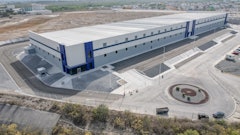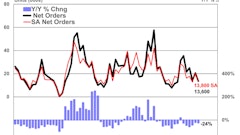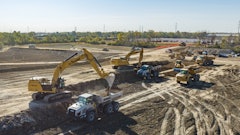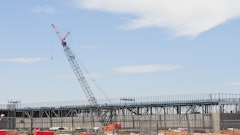You seldom get a clearer example of politicians defying the American public's will than in the neglected funding of U.S. transportation infrastructure.
The current 18.4-cent federal tax imposed on gasoline in 1993 (yeah, 16 years ago) has proven inadequate to cover the costs of maintaining and improving the U.S. transportation system. After being financially independent for more than 50 years, the federal Highway Trust Fund now relies on transfers from the General Fund to stay solvent.
Americans want better infrastructure, and we're willing to pay for it. In late 2008, GOP pollster Frank Luntz measured a stunning 81% of people who would pay higher taxes to repair and upgrade our infrastructure (thanks to The Infrastructurist).
A poll earlier this month found 55% of Nevadans favor raising taxes to improve and expand roads.
Business is behind a House bill that would raise the diesel fuel tax on trucks by 12 cents per gallon to generate funds for infrastructure projects targeted at freight movement.
But taxing gasoline or diesel any flat number of cents per gallon is about as equitable and carefully reasoned as would be taxing incomes at some flat dollar amount per day that a person works.
Current federal gasoline and diesel taxes are not indexed to inflation. The Highway Trust Fund is inadequate even to prevent further deterioration of our transportation infrastructure, let alone improve the system. As the government mandates more fuel-efficient cars and hybrid, electric and alternate-fueled vehicles enter the marketplace, the budget crisis will deepen.
A recent, reputable, report urges Congress to pass legislation setting up a fee system based on vehicle miles traveled to replace fuel taxes. It's a good idea that unfortunately would likely require the use of invasive technology to be administered with accuracy. It would be interesting to see how it works on commercial vehicles that are more uniformly fitted with global positioning systems to facilitate mileage tracking.
In the meantime, simply taxing gasoline and diesel as a percentage of their cost (like virtually all other mass-consumed products) is a far more efficient way to make revenues collected from road users more accurately reflect the value that their use takes out of roads.
The American Association of State Highway and Transportation Officials outlined for congress an option to convert federal gas and diesel taxes from cents per gallon to a percentage of cost. AASHTO recommends an 8.4% tax on a gallon of gas and 10.6% on diesel, and estimates the changes could raise an additional $43 billion over six years if fuel costs rise as expected.
Sounds pretty good until you realize that when the 18.4-cent federal tax was imposed on gasoline in 1993 it represented roughly 16.9% of the cost of a gallon of gas (the diesel tax, at 24.4 cents, was about 22%). What makes AASHTO think that we can build and maintain a competitive conduit for U.S. commerce with just half the value we built into our initial tax structure?
Taxing gasoline at 16.9% of today's value would have made the federal gas tax 47.6 cents per gallon on October 11, 2010. (Taxing on-road diesel at 22% would have raised the price 67.5 cents.) Mean state gas taxes are about 27.2 cents per gallon. That's a total of 74.8 cents in taxes on a gallon of gas – with a high of 82.9 cents in California and a low of 55.1 cents in Georgia.
Nobody likes to pay more taxes, but it is time to demand that our elected officials exercise the discipline to stop the degeneration of this country's vital infrastructure. It's time to stand up for an increase in gas taxes. Without proper balance between our funding and use of roads and bridges, we will pass a crippling deficit to our children.
For a comparison of possible highway user charges based on fuel consumption, based on distance traveled and based on congestion, see the paper called "Transportation Revenue Options: Infrastructure, Emissions, and Congestion."
Companies in this article


























